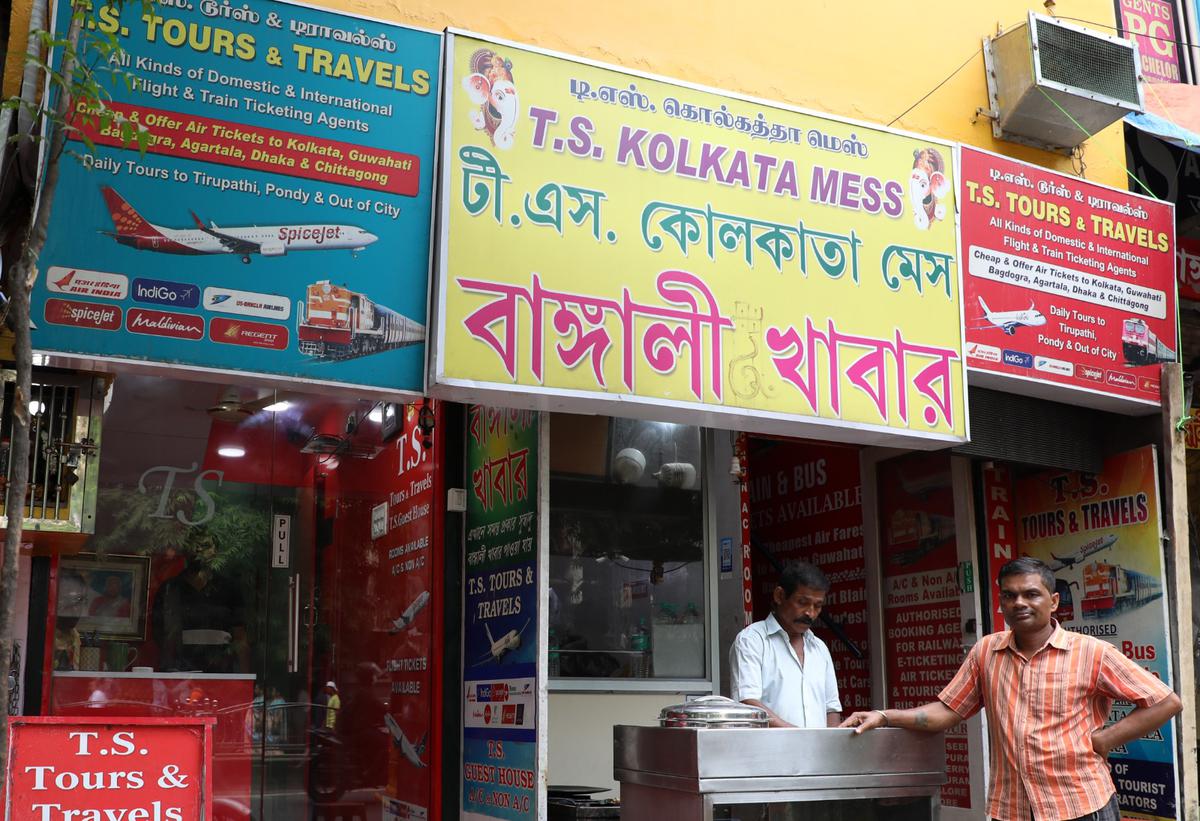Bengali food, culture, and conversations flow at Chennai’s Mackay’s Garden

A paan shop and a travel and ticketing counter at Mackay’s Garden
| Photo Credit: Akhila Easwaran
On a cloudy morning, a teenager wearing a Che Guevara t-shirt walks past a wall mural of Mother Mary that reads Mother Mary Amader Ma (Mother Mary is our mother) inscribed in Bengali. Currency notes of Bangladeshi taka and the American dollar share frames on foreign exchange billboards. Fish is sold and cut in what is called the ‘ bangali (Bengali) cut’. This is not Kolkata. This is Mackay’s Garden, Greams Road — a part of Chennai where the absence of Kolkata broods in its presences.
A wall mural of Mother Mary reads Mother Mary Amader Ma (Mother Mary is our mother) inscribed in Bengali.
| Photo Credit:
Akhila Easwaran
Locally referred to as mini Bengal, Mackay’s Garden is dotted with Bengali food messes, Bengali-speaking vegetable vendors, bustling travel and ticketing counters, pharmacies, fruit shops and hot tea or cha sellers. Most billboards are written in English with a qualifying line in Bengali.

Bengali food messes and travel and ticketing counters inundate the area.
| Photo Credit:
Akhila Easwaran
Fisherman Rogers opens shop at 7am. His cart is decked with Rui fish, katla or the Carp fish and the ‘neel kan wala chingri’ or the blue-tinged prawns, so coveted among the fish-loving community. Rogers speaks a fluent Hindi and is able to understand Bengali. He says that most of his customers ask for their fish to be cut according to the bangali ishtyle : the belly or ‘peti‘ where the bones of the fish are minimal are sliced into roughly-rectangular pieces. The bile, fat sac and inner organs of the fish are separated, eggs are taken out and the head and tail of the fish are severed. The remainder of the fish is then cut in triangular pieces.
Sights and sounds
Wearing a batik print kurta, his lungi tied firmly around his waist, Ritam Sutradhar says, “I have been staying in Chennai for the last five days. I am here with my mother for her eye treatment . I come to Mackay’s in the morning to buy fresh fish and groceries,” he says.
Morning breakfast being prepared at Vishal Mess.
| Photo Credit:
Akhila Easwaran
Throughout the year, guest houses remain occupied by Bengali clients — each zany in their own right. Rimpa Saha, a resident of the suburban areas of West Bengal is in Chennai for her mother-in-law’s knee treatment. She says, “My mother-in-law likes to stay at a particular room in her preferred guest house which was booked this time. She insists on coming to Chennai for her treatment because the doctors take a personal interest. In reality, I believe she cannot stomach the doctor’s diagnosis, without drinking the hospital coffee!” jokes Rimpa.
The Bangladeshi taka and the American dollar share frames.
| Photo Credit:
Akhila Easwaran
Monisha Sen runs a grocery shop in the area. Her husband runs a mess in the area. She says that most of her patrons are floating customers who come from Bengal, Assam, Bihar, the North East, and Bangladesh.
“Since Bengalis don’t enjoy the rice available here in the ration shops, I source the grain from Haryana and Punjab. My husband sources vegetables from West Bengal. Everything else is procured locally,” adds Monisha.
Monisha Sen at her grocery shop, serving tea
| Photo Credit:
Akhila Easwaran
Asking Monisha for a cup of tea is Mohammed Sinjid. A native of Bangladesh, Sinjid is on his sixth visit to Chennai. As he sits at the corner, he says, “The fish available here is very reasonably priced. I like to buy rui and katla. The bigger catches are more tasty than the smaller ones. At the guest house, I cook for myself and my uncle – who is here for a bypass.”
Sinjid has been staying at Well Stay Guest House in Mackay’s Garden which provides residents with amenities for cooking. The fisheries merchant adds, “Doctors and local people in Chennai have a warmth that brings me back to the city.”
The blind lanes and bylanes in Mackey’s Garden are constantly listening for sounds — it may be the bickerings of the old couple living in the ground floor of Zarin Manzil, the child in oversized pants playing ‘kumeer danga’ (crocodile and the bank), or the busy Samar babu smoking a beedi to induce Nature’s call. Through every alley, the distant city returns to itself.
For all the latest Life Style News Click Here
For the latest news and updates, follow us on Google News.
